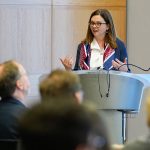
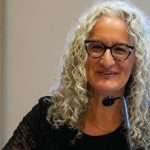
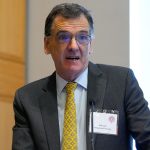
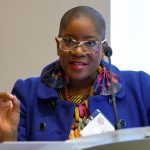
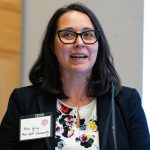
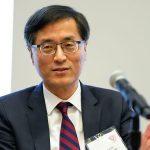
Fordham hosted a wide-ranging, multi-disciplinary conference on May 1 and 2 at the Lincoln Center campus that addressed the sources of environmental degradation, racism, ableism, and rising inequality with regard to access to resources and information around the world.
In her welcoming remarks at the International Conference on Social and Environmental Justice, Fordham President Tania Tetlow noted that the conference’s goals were perfectly in sync with the four apostolic preferences of the Society of Jesus.
They are “walking with the excluded,” “caring for our common home,” “journeying with youth,” and committing to discernment, or “doing it all with openness and humility by listening and learning,” she said.
“My hope is that you will energize and inspire each other, that we will come up with the sorts of solutions that lie in the complexity, ” she said.
“And that we do it in a way that models that for our students because that is all about where we can locate the hope.”
The conference, which was organized by Fordham’s Office of the Provost, Office of Research, and Office of the Chief Diversity Officer, was supported by Fordham, Columbia University, Georgetown University, and New York University. Additional funding was provided by Fordham’s Office of the Chief Diversity Officer.
Ten-panel discussions followed two keynote addresses by Molly Doane, Ph.D., associate professor of anthropology at the University of Illinois-Chicago, and Alex Gil, Ph.D., senior lecturer II and associate research faculty at Yale University.
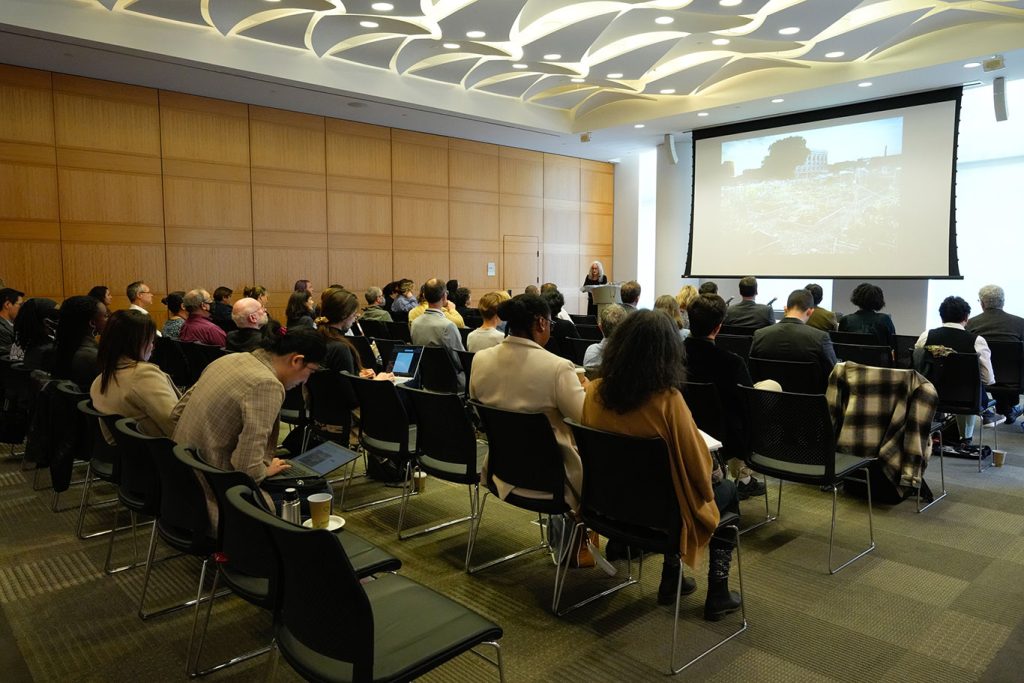
Community Gardens and Food Justice
Doane shared stories of working with three community gardens on the west, north, and south sides of Chicago, in a lecture titled “Climate Stories: Gardening at the City’s Edge in Chicago.” Far from simply being spots for food production, she said the gardens are beacons of hope for marginalized communities, including refugees from Iraq.
The Hello Howard Community Garden, where she is a member, contributes produce to a local food bank, even though yields can be uncertain.
“We gardeners donate to refugee programs for the same reason we flew to Lesbos to sort donated clothing in a warehouse after seeing a picture of that sweet little boy washed up on the shore there, the same reason we hang the ‘Hate Has No Home Here’ signs and the reason we flocked to O’Hare after refugees were detained after Trump signed the Muslim ban,” she said.
“I work in food not because it’s the be-all, end-all. It’s because it’s a tool to dismantle racism and create some racial equity and create living, thriving economies that people can control and have some sovereignty”
Minimal Computing and Access to Technology
In “Minimal Computing and Environmental Justice: A Humble Offering,” Gil shared the ways in which digital projects such as Open Syllabus, which has collected and analyzed 7.2 million college syllabi, and WAX, which helps researchers create digital archives, are making it easier to empower people who don’t have the same access to technology that is common in the United States, Europe, and Asia.
Minimal computing, which is a way of developing technology that can be used in the absence of hardware, software, network capacity, technical education, or even a reliable power grid, is one option.
“How do we do design if we don’t take for granted that everyone has fast, free internet, no censorship, and electricity all the time?” he said.
“Minimal computing tries to imagine constraints all over the world and designs for it.”
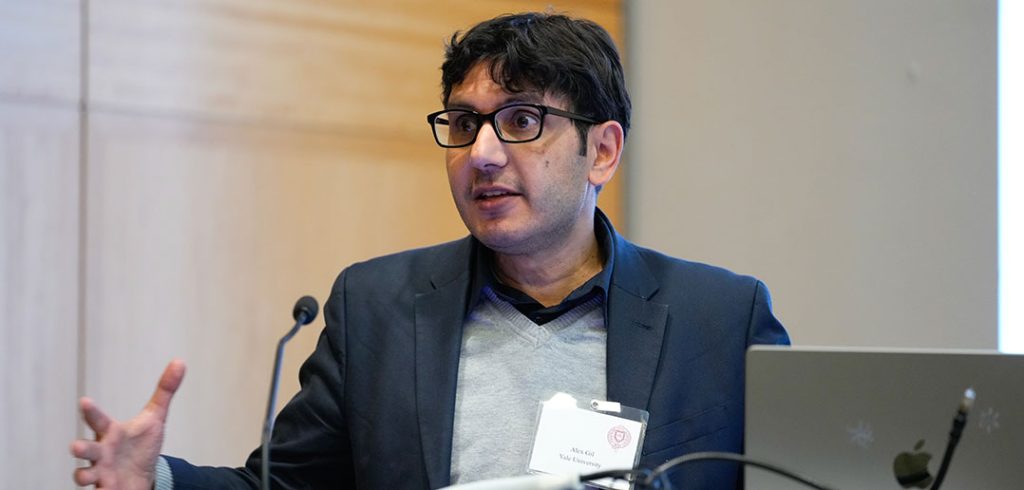
Environmental Economics, Justice, and Policy
In the panel Environmental Economics, Justice, and Policy, R. Jisung Park, Ph.D., assistant professor of economics at the University of Pennsylvania, showed how the increase in 90-degree days presents a greater risk of heat-related injuries than previously thought to those who work in jobs outside, as well as some who work in manufacturing.
Beia Spiller, director of the Transportation Program at Resources for the Future, made the case for greater public funding for electric vehicle charge stations in the Bronx.
And Marc N. Conte, Ph.D., a professor of economics at Fordham, shared the findings of a forthcoming paper, “Observational studies generate misleading results about health effects of air pollution: evidence from chronic air quality conditions and COVID-19 outcomes”. His study aimed to address the fact that in New York City, Black residents succumbed to COVID-19 in greater numbers than white residents.
Since the areas of the city where they live feature high ambient concentrations of air pollution, Conte wanted to see whether the two facts were connected. He concluded they are not, in part by analyzing phone data that showed that white, wealthy residents of the Upper East Side, which has similar levels of air pollution, may have been spared because they simply left the city during the pandemic.
“I’m not saying that Black and brown communities were not adversely affected by COVID. What I’m saying is, it wasn’t because they lived necessarily in areas with worse air quality,” he said.
“[P]eople in these communities had jobs that forced them to work in person. So they were actually here and present and exposed to this virus in a way that people in wealthier, whiter communities were not. I think that’s actually a larger systemic racism problem than an air quality issue.”
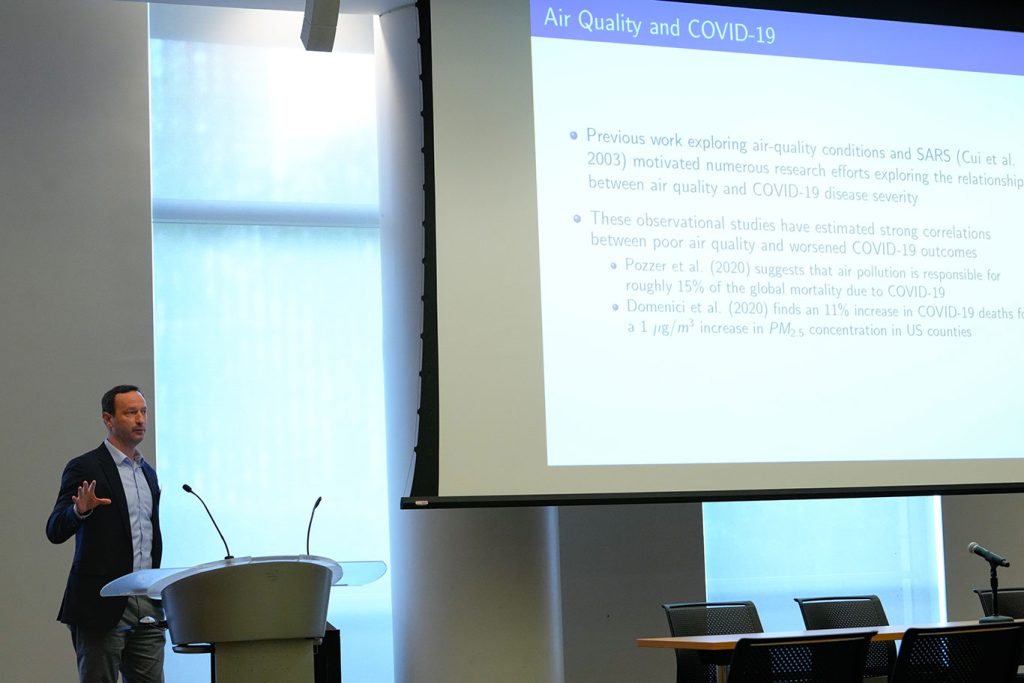
In the closing session, George Hong, Ph.D., Chief Research Officer and Associate Vice President for Academic Affairs at Fordham, hailed the gathering for bringing together perspectives from 13 different countries, representing nonprofit government organizations, academia, community groups, and private industry. Fordham has also been invited to publish the research presented in an upcoming issue of the academic journal Social Sciences.
The final session also featured remarks from Fordham professors Steven Franks, Ph.D., Nicholas Paul, Ph.D., Aseel Sawalha, Ph.D., and Sophie Mitra, Ph.D.
Franks highlighted the fact that so many participants conducted research in partnership with community organizations.
“This is getting out of the colonialist, or post-colonial mindset of sort of sweeping in to solve the problems of those people, and really just working with local communities to find out how we can all benefit from each other and solve problems together,” he said.
]]>“Today’s events are designed for recognition, celebration, and appreciation of the numerous contributors to Fordham’s research accomplishments in the past two years,” said George Hong, Ph.D., chief research officer and associate vice president for academic affairs.
Hong said that Fordham has received about $16 million in faculty grants over the past nine months, which is an increase of 50.3% compared to the same period last year.
“As a research university, Fordham is committed to excellence in the creation of knowledge and is in constant pursuit of new lines of inquiry,” said Joseph McShane, S.J., president of Fordham, said during the virtual celebration. “Our faculty continue to distinguish themselves in this area. Today, today we highlight the truly extraordinary breadth and depth of their work.”
Earning Honors
Ten faculty members, representing two years of winners due to cancellations last year from the COVID-19 pandemic, were recognized with distinguished research awards.
“The distinguished research awards provide us with an opportunity to shine a spotlight on some of our most prolific colleagues, give visibility to the research achievements, and inspire others to follow in their footsteps,” Provost Dennis Jacobs said.
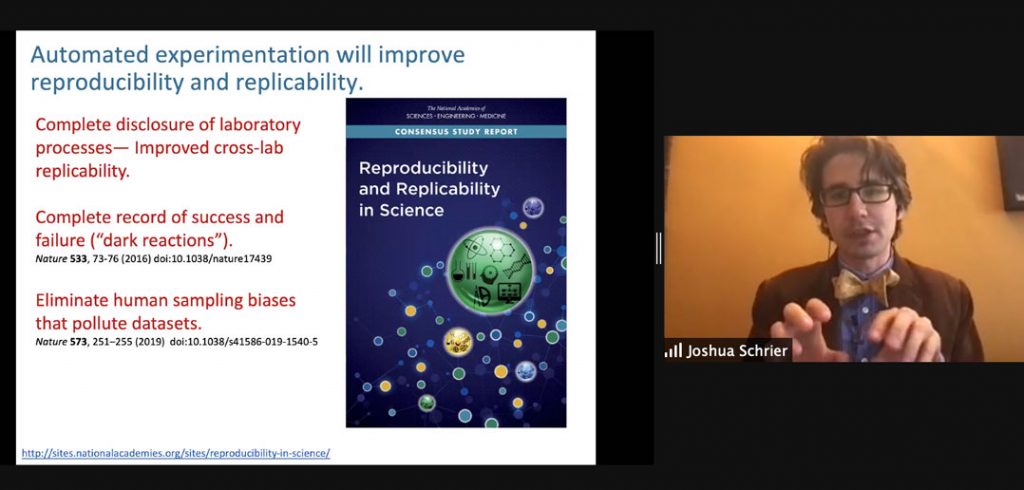
Recipients included Yuko Miki, associate professor of history and associate director of Latin American and Latinx Studies (LALSI), whose work focuses on Black and indigenous people in Brazil and the wider Atlantic world in the 19th century; David Budescu, Ph.D., Anne Anastasi Professor of Psychometrics and Quantitative Psychology, whose work has been on quantifying, judging, and communicating uncertainty; and, in the junior faculty category, Santiago Mejia, Ph.D., assistant professor of law and ethics in the Gabelli School of Business, whose work examines shareholder primacy and Socratic ignorance and its implications to applied ethics. (See below for a full list of recipients).
Diving Deeper
Eleven other faculty members presented in their recently published work in the humanities, social sciences, and interdisciplinary studies.
Jews and New York: ‘Virtually Identical’
Images of Jewish people and New York are inextricably tied together, according to Daniel Soyer, Ph.D., professor of history and co-author of Jewish New York: The Remarkable Story of a City and a People (NYU Press, 2017).
“The popular imagination associated Jews with New York—food names like deli and bagels … attitudes and manner, like speed, brusqueness, irony, and sarcasm; with certain industries—the garment industry, banking, or entertainment,” he said. “
Soyer quoted comedian Lenny Bruce, who joked, “the Jewish and New York essences are virtually identical, right?”
Soyer’s book examines the history of Jewish people in New York and their relationship to the city from 1654 to the current day. Other presentations included S. Elizabeth Penry, Ph.D., associate professor of history, on her book The People Are King: The Making of an Indigenous Andean Politics (Oxford University Press, 2019), and Kirk Bingaman, Ph.D., professor of pastoral mental health counseling in the Graduate School of Religion and Religious Education, on his book Pastoral and Spiritual Care in a Digital Age: The Future Is Now (Lexington Books, 2018).
Focus on Cities: The Reality Beyond the Politics
Annika Hinze, Ph.D, associate professor of political science and director of the Urban Studies Program, talked about her most recent work on the 10th and 11th editions of City Politics: The Political Economy of Urban America (Routledge, 11th edition forthcoming). She focused on how cities were portrayed by the Trump Administration versus what was happening on the ground.
“The realities of cities are really quite different—we’re not really talking about inner cities anymore,” she said. “Cities are, in many ways, mosaics of rich and poor. And yes, there are stark wealth discrepancies, growing pockets of poverty in cities, but there are also enormous oases of wealth in cities.”
When the COVID-19 pandemic hit, Hinze’s latest edition will show how urban density did not contribute to the spread of COVID-19, as many people thought, but rather it was overcrowding and concentrated poverty in cities that led to accelerated spread..
Other presentations included Nicholas Tampio, Ph.D., professor of political science, on his book Common Core: National Education Standards and the Threat to Democracy (Johns Hopkins University Press, 2018); Margo Jackson, Ph.D., professor and chair of the division of psychological and educational services in the Graduate School of Education on her book Career Development Interventions for Social Justice: Addressing Needs Across the Lifespan in Educational, Community, and Employment Contexts (Rowman and Littlefield, 2019); and Clara Rodriguez, Ph.D., professor of sociology on her book America, As Seen on TV: How Television Shapes Immigrant Expectations Around the Globe (NYU Press, 2018).
A Look into Migration
In her book Migration Crises and the Structure of International Cooperation (University of Georgia Press, 2019), Sarah Lockhart, Ph.D. assistant professor of political science, examined how countries often have agreements in place to manage the flow of trade, capital, and communication, but not people. While her work in this book specifically focused on voluntary migration, it also had implications for the impacts on forced migration and the lack of cooperation among nations .
“I actually have really serious concerns about the extent of cooperation … on measures of control, and what that means for the future, when states are better and better at controlling their borders, especially in the developing world,” she said. “And what does that mean for people when there are crises and there needs to be that kind of release valve of movement?”
Other presentations included: Tina Maschi, Ph.D., professor in the Graduate School of Social Service, on her book Forensic Social Work: A Psychosocial Legal Approach to Diverse Criminal Justice Populations and Settings (Springer Publishing Company, 2017), and Tanya Hernández, J.D., professor of law on her book Multiracials and Civil Rights: Mixed-Race Stories of Discrimination (NYU Press, 2018).
Sharing Reflections
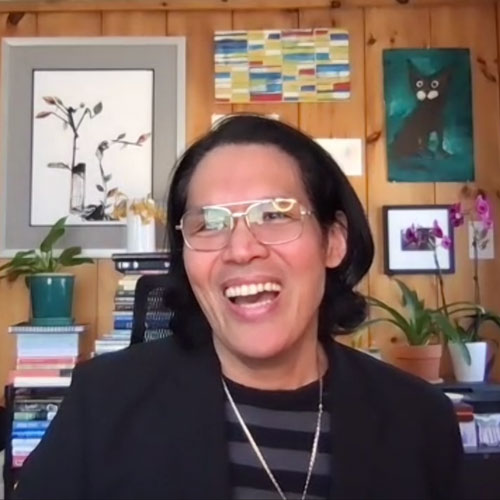
The day’s keynote speakers—Daniel Alexander Jones, professor of theatre and 2019 Guggenheim Foundation Fellow, and Tony Award winner Clint Ramos, head of design and production and assistant professor of design—shared personal reflections on how the year’s events have shaped their lives, particularly their performance and creativity.
For Jones, breathing has always been an essential part of his work after one of his earliest teachers “initiated me into the work of aligning my breath to the cyclone of emotions I felt within.” However, seeing another Black man killed recently, he said, left him unable to “take a deep breath this morning without feeling the knot in my stomach at the killing of Daunte Wright by a police officer in Minnesota.”
Jones said the work of theatre teachers and performers is affected by their lived experiences and it’s up to them to share genuine stories for their audience.
“Our concern, as theater educators, encompasses whether or not in our real-time lived experiences, we are able to enact our wholeness as human beings, whether or not we are able to breathe fully and freely as independent beings in community and as citizens in a broad and complex society,” he said.
Ramos said that he feels his ability to be fully free has been constrained by his own desire to be accepted and understood, and that’s in addition to feeling like an outsider since he immigrated here.
“I actually don’t know who I am if I don’t anchor my self-identity with being an outsider,” he said. “There isn’t a day where I am not hyper-conscious of my existence in a space that contains me. And what that container looks like. These thoughts preface every single process that informs my actions and my decisions in this country.”
Interdisciplinary Future
Both keynote speakers said that their work is often interdisciplinary, bringing other fields into theatre education. Jones said he brings history into his teaching when he makes his students study the origins of words and phrases, and that they incorporate biology when they talk about emotions and rushes of feelings, like adrenaline.
That message of interdisciplinary connections summed up the day, according to Jonathan Crystal, vice provost.
“Another important purpose was really to hear what one another is working on and what they’re doing research on,” he said. “And it’s really great to have a place to come listen to colleagues talk about their research and find out that there are these points of overlap, and hopefully, it will result in some interdisciplinary activity over the next year.”
Distinguished Research Award Recipients
Humanities
2020: Kathryn Reklis, Ph.D., associate professor of theology, whose work included a project sponsored by the Henry Luce Foundation on Shaker art, design, and religion.
2021: Yuko Miki, Ph.D., associate professor of history and associate director of Latin American and Latinx Studies (LALSI), whose work is on Black and indigenous people in Brazil and the wider Atlantic world in the 19th century.
Interdisciplinary Studies
2020: Yi Ding, Ph.D., professor of school psychology in the Graduate School of Education, who received a $1.2 million grant from the U.S. Department of Education for a training program for school psychologists and early childhood special education teachers.
2021: Sophie Mitra, Ph.D., professor of Economics and co-director of the Disability Studies Minor, whose recent work includes documenting and understanding economic insecurity and identifying policies that combat it.
Sciences and Mathematics
2020: Thaier Hayajneh, Ph.D., professor of computer and information sciences and founder director of Fordham Center of Cybersecurity, whose $3 million grant from the National Security Agency will allow Fordham to help Historically Black Colleges and Universities and Minority-Serving Institutions build their own cybersecurity programs.
2021: Joshua Schrier, Ph.D., Kim B. and Stephen E. Bepler Chair and professor of chemistry, who highlighted his $7.4 million project funded by the Defense Advanced Research Projects Agency on perovskites.
Social Sciences
2020: Iftekhar Hasan, Ph.D., university professor and E. Gerald Corrigan Chair in International Business and Finance, whose recent work has included the examination of the role of female leadership in mayoral positions and resilience of local societies to crises.
2021: David Budescu, Ph.D., Anne Anastasi Professor of Psychometrics and Quantitative Psychology, whose work has been on quantifying, judging, and communicating uncertainty.
Junior Faculty
2020: Asato Ikeda, Ph.D., associate professor of art history, who published The Politics of Painting, Facism, and Japanese Art During WWII.
2021: Santiago Mejia, Ph.D., assistant professor of law and ethics in the Gabelli School of Business, whose work focuses on shareholder primacy and Socratic ignorance and its implications to applied ethics.
The virtual event is hosted by the Office of Research, and will include remarks from George Hong, Ph.D., chief research officer and associate vice president for academic affairs, and Vice Provost Jonathan Crystal, Ph.D.
“The Office of Research decided on this forum’s theme because it ties in closely with one of the two top priorities this year for our office and for the University overall,” Hong said. “The other top issue guiding our priorities is COVID-19 research.”
The forum will feature four presentations from Fordham faculty and students.
Tanya Kateri Hernandez, Archibald R. Murray Professor of Law at the School of Law’s Center on Race, Law & Justice will present her work on “Latino Anti-Black Bias: ‘Racial Innocence’ and the Struggle for Equality.
Jeannine Hill Fletcher, Ph.D., professor of theology, will present her research on “Grace of the Ghosts: Encountering Institutionalized Racism.”
Hrishikesh Vinod, Ph.D., economics professor, and Katherine Theiss, a doctoral student in the Department of Economics, will explore “A Novel Solution to Overcoming Testing Bias in Covid-19 Incidence Studies.”
Xiaofang Liu, a Ph.D. candidate in the Graduate School of Social Service, and a study coordinator at the Columbia Population Research Center, teamed up with Professor Qin Gao, Ph.D, Director of the China Center for Social Policy and professor of social work at Columbia University to present on “Racial Discrimination Against Asian Americans During COVID-19: What Do We Know and What Must Be Done?”
Hong said that he hoped the forum would not only showcase faculty work internally but also help raise their profiles.
“Our desired takeaways for those attending are three-fold—first, we hope our speakers will raise awareness of their research on anti-racism across the University,” he said.
“Secondly, we would like to enhance and develop networks for our faculty and student research collaborations on anti-racism. Thirdly, we want to encourage our faculty to seek out and win external grants to support their research in the battle of end racism.”
Those interested in attending can join via Zoom.
]]>This past May, Fordham took a big step toward embracing this new world, as 14 members of the faculty and administration traveled to Sophia University in Japan as part of the first Fordham Faculty Research Abroad program.
The delegation, which was led by Fordham’s provost, the late Stephen M. Freedman, Ph.D., hailed from fields as varied as political science, economics, biological sciences, education, social service, and art history. The theme of the trip was comparative urban studies.
George Hong, Ph.D., chief research officer and associate vice president for academic affairs, said the trip was the result of Fordham’s Continuous University Strategic Planning (CUSP) process, which the University began in 2015.
In the CUSP process, four areas were given high priority: Interdisciplinary research, sponsored research, global research, and faculty-student research collaborations. This trip fulfilled all of those priorities by bringing Fordham researchers into contact with peers in Japan who are pursuing research on many topics within that field. It also established an exchange program for faculty and students between the two schools.
Collaborating on Food Justice
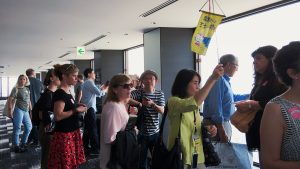
One of those connections was between Garrett Broad, Ph.D., assistant professor of Communication and Media Studies and James Farrer, Ph.D., a professor of sociology and global studies at Sophia University. Farrer has been researching food entrepreneurship in Tokyo and the role that small vendors play in local economies, a topic of interest to Broad, who penned More Than Just Food: Food Justice and Community Change (University of California Press, 2016).
“We’re talking about setting up a workshop here in New York at some point next year where we bring together a group of scholars who are exploring issues related to food, society, globalization and local food economies,” Broad said.
“The hope for this enterprise is it’s not a one off, where we had this nice trip to Tokyo, made some friends and that’s that. We want to continue and build some partnerships, and since there’s only so much you can do in just a few days, a workshop is a way we can keep the momentum going.”
Broad also took the opportunity to visit and interview scientists at a Tokyo organization that is experimenting with “cellular agriculture.” The technology, which Broad had already been researching for an upcoming project, involves growing meat in a laboratory, negating the need to slaughter animals. To help him overcome language and cultural barriers, he recruited Sophia University undergraduate students to accompany him.
Making Personal Connections in the Field
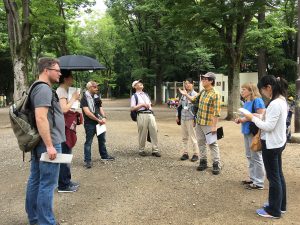
Annika Hinze, Ph.D., assistant professor of political science and director of Fordham’s urban studies program, came away from the trip deeply affected by potential collaborations. While one group from Fordham was given a tour related to sustainability and environmental issues, she attended a tour centered on social issues that was led by Nanako Inaba, a professor in Sophia’s department of global studies.
Of particular interest to Hinze was a public park that had recently been partially sold to private interests, including Nike. A sizable homeless population still calls the park home, and Hinze interviewed one of them to get a sense of how his presence was actually a form of protest.
“I’m a field researcher first and foremost, and in order to understand places, it’s vital to actually visit them and get to know them a little bit. The initial connections you make with people can be the jumping point for creating meaningful research partnerships,” she said.
“The walking tours were amazing, because they were done by people who are academics who are researching social or sustainability issues and who really know the environment.”
Global Partnerships Critical to Funded Research
Connections such as these are crucial to solving challenges, Hong said. They’re also often a prerequisite for researchers who wants to get their projects funded by some external sources.
“More and more American foundations are requiring global partnership as precondition for applications. If you don’t have an international partner, you are out,” he said.
On that front, the trip was also a success, as Fordham faculty identified 27 researchers in Japan who are ready to collaborate on joint grant proposals, research projects, and research papers. Hong and his team also identified more than 40 funding opportunities to support these research projects. Several faculty members are working on joint proposals, he said, and one has already submitted one. He expects that there will be opportunities for Fordham students to assist in future studies as well.
Hong noted that a byproduct of Fordham faculty traveling together was also an increase in collaborations amongst themselves. Next summer, a group of them will travel to Europe, where the theme will be “digital scholarship.”
“They immediately picked up some ideas and learned from each other. It was the same subject, urban studies, but different disciplines, education, social service, the sciences, history, social sciences, humanities, natural science,” he said.
In addition to prearranged meetings, there were serendipitous meetings at Sophia University as well. Takehiro Watanabe, Ph.D., an associate professor of anthropology at Sophia whose research touches on participatory community environmental processes, led the Fordham contingent on a tour of a river revitalization project and chaired a panel discussion that Broad participated in.
“Afterward, he saw some things in my presentation that connected to some of the subjects that he’s interested in, such as participatory science and citizen science,” Broad said.
“The more time you’re able to spend, and the more people you’re able to meet, you realize you have more in common.”
]]>The University Research Council and Office of Research presented the Outstanding Externally Funded Research Awards (OEFRA) to recognize the high quality and impact of the honorees’ sponsored research within the last three years and how their work has enhanced Fordham’s reputation—both nationally and globally.
Faculty were honored in five separate categories, and were presented awards by University Provost Stephen Freedman, Ph.D.:
Humanities: Nina Rowe, Ph.D., Associate Professor of Art History and Music in the Graduate School of Arts and Sciences
Rowe, an expert in the art of northern Europe in the high and late Middle Ages, recently received a $4,000 grant from the American Philosophical Society and fellowships totaling $95,000 from the National Endowment for the Humanities and the American Council of Learned Societies. She used the awards to fund research for her current book project, From Adam to Achilles to Alexander: World Chronicles and the Anecdotal Past in the Late Medieval City.
Interdisciplinary Research: Chun Zhang, Ph.D., Professor of Curriculum and Teaching at the Graduate School of Education
Zhang has worked with colleagues at Columbia University and New York University to investigate workforce development in universal preschool programs in New York City. At Fordham, she has collaborated with Yi Ding, Ph.D., associate professor of school psychology, and Tiedan Huang, Ed.D., assistant professor of educational leadership, administration, and policy, to secure research funding. Her efforts have netted awards and grants totaling more than $2.8 million for studies that will impact the lives of children with special needs and their families.
Junior Faculty Research: Jordan DeVylder, Ph.D., Associate Professor at the Graduate School of Social Service
DeVylder, who joined the Fordham faculty in 2017, has a keen interest in preventive mental health, with an emphasis on psychosis and suicide. He is currently conducting a randomized trial to test an intervention to improve detection of untreated psychosis by community social workers. The trial is being funded by a $680,000 National Institute of Mental Health grant. DeVylder also recently won an $85,000 grant from the American Foundation for Suicide Prevention.
Sciences: Jason Munshi-South, Ph.D., Associate Professor of Biological Sciences
An expert in the burgeoning field of urban ecology, Munshi-South was awarded a $600,000 research grant from the National Science Foundation in 2015 to study the evolutionary biology of wild rats. Since then, the NSF has granted multiple sub-awards , some of which have involved bringing undergraduates from other campuses to work with him during the summer. The NSF has continued to increase this award annually; its total is expected to reach over $672,000 this year. In total, Munshi-South has received more than $1 million in grants from the NSF, the National Institute of Health, and other foundations and organizations.
Social Sciences: Yilu Zhou, Ph.D., Associate Professor of Information Systems at the Gabelli School of Business
Zhou is the first faculty member from the Gabelli School of Business to be awarded a National Science Foundation grant, for her research project, “Can You Trust Apps Age Recommendations? Inconsistent and Unreliable Maturity Ratings on Mobile Platforms.” An expert on human-computer interactions and social media mining, she received two awards totaling $245,000 from the NSF for the project.
George Hong, Ph.D., chief research officer and associate vice president for academic affairs, touted the fact that from July 1, 2017, to March 31, 2018, Fordham faculty submitted 116 new grant proposals—an increase of 142 percent over the same period last year—and that faculty has received 82 awards in the past nine months.
Joseph M. McShane, S.J., president of Fordham, commended the winners for the example they set for their students.
“I wanted to congratulate all of you for renewing the heart of the University, in a really significant way, and giving all of our students inspiration, hope, and great pride,” he said.
Organized by the Office of Research and the University Research Council and sponsored by the University Research Compliance Council and the Office of Sponsored Programs, the daylong event included a workshop devoted to compliance awareness, a forum of humanities researchers, and a keynote speech by Jennifer Saak, Ph.D., managing director of Traliance.
]]>“This is a great opportunity for Fordham faculty, particularly in light of the increasing emphasis in many disciplines on interdisciplinary, multi-institution research projects,” said J.D. Lewis, Ph.D., chair of the University Research Council.
“The research fellows program nicely complements the ongoing opportunities faculty have through the Bronx Science Consortium, providing faculty with opportunities to develop collaborations that move their research in new directions.”
Faculty members who are interested in the program must submit nominations and self-nominations to the dean of the school of their affiliation by January 30. By March 1, deans from each school will submit their nominations to Z. George Hong, Ph.D., chief research officer and associate vice president for academic affairs.
Fellows will be announced by April 1.
The fellowship will commence on May 15 and continue through August 15, 2017.
In addition to being full-time tenure-track or tenured faculty members, applicants should have demonstrable success in conducting research and strong credentials, including grant activities and publications. Applicants are also required to have a plan for collaborating with a Columbia scholar using resources provided by that scholar either independently or in conjunction with a Columbia research institute.
Benefits include access to Columbia’s research facilities, equipment and workspaces and up to $5,000 in support of the fellow’s professional development and scholarly activities from the Office of Research at Fordham.
After completing the summer program, fellows will deliver a public presentation on their project on the Fordham campus. Additionally, fellows are also expected to produce scholarly publications, submit external grant proposals, develop interdisciplinary research collaboration, and participate in conference presentations about their research.
“Not only will this allow faculty to leverage their existing research in new ways, it should also help increase the impact and visibility of their research programs,” said Lewis.
For more information on nomination and application procedures, contact George Hong via [email protected].
]]>